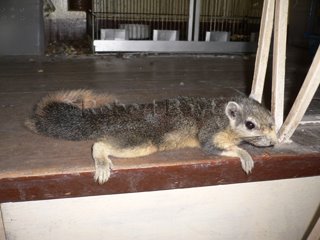The
top three smuggled goods in the world are drugs, weapons, and animals.
Animals
rank highly because they are kept as pets, used for business, served as exotic
dishes, and administered as potent medicines.
Many of these animals are endangered, while some are simply exotic
without threat of extinction.
I
keep a number of exotic, not-at-risk pets, the oldest of which is a squirrel.1
Sometimes
I feel sad for Hinata, my squirrel. I
occasionally catch her staring at the ceiling, her body curled in the food
bowl, her fingers stuck in her mouth, like a human child in fetal
position. Is gallivanting in an expanse
of green field included in her ruminations?
Hinata
was caught from the wild at a very young age.
She was around 8 weeks old when I acquired her from Arranque over 2
years ago.
I
wonder if she was better off with a custodian other than I. I wonder if she would have survived the wild
if no one had caught her.
I
expect it is sad to be forcibly removed from one’s residence, but a pet lover’s
desire, more often than not, overrides an animal’s desire for freedom; hence,
the high rank of animals as smuggled goods.
I
document my pets’ life through photos, and it is apparent my Hinata is aging.
Did
or does she want to find her soul mate?
Does she want babies of her own?
Does she consider her life with me as single blessedness or singular
penance?
I
got Hinata a partner before, but the male squirrel met an accident resulting in
its early demise. Was Hinata ever
attracted to the male squirrel? Is she
homosexual like me?
How
long do tree squirrels live in captivity?
How long do they live in the wild?
Do we have another 2 or more years together? The Net does not provide enough data
regarding local species.2
Looking
at Hinata in her moments of melancholy gives me a sense of foreboding. I have kept and loved rodents for two
decades, and experience dictates that rodents do not last very long. Rodents in my custody rarely reached 2 years.
Hinata
is around the size of or is slightly larger than a rat, and larger rodent
breeds last a little bit longer than the smaller ones.
While
I worry about Hinata’s life span, I find comfort in the fact that I care for my
pets like they are my own flesh and blood.
My
pets give me happiness the way no human can.
It is simply fitting to give them what I can while they walk on this
gracious earth… with me.
Notes
1Internet
search in 2009 returned pictures of Samar squirrels resembling Hinata.
This
YouTube video
<https://www.youtube.com/watch?v=36ANWAvrpNg> of the Philippine
tree squirrel in the Manila Zoo was published on 13 July 2014 by Junar Nabong. Compare the squirrel on the video with Hinata
in the photos.
2I
read somewhere before that squirrels can live for as long as 7 years. My Hinata lived for at least 9.5 years. I acquired Hinata on 11 April 2009 when she
was around 8 weeks old (that makes February 2009 her birth month). Hinata died today, 5 November 2018. Hinata is named after the wife (then admirer)
of Naruto, possibly the most famous fictional ninja in the world.
About the photos
The
first photo shows Hinata at 1 year of age.
The
second photo shows Hinata celebrating her 3 years with me. I let Hinata roam free now and then (with
supervision because she liked to gnaw).
I once saw her gnaw through a half-inch thick wood in seconds.
===
Originally
written in a slightly different form without the endnotes and without the photos (in Facebook) on
21 April 2011.


